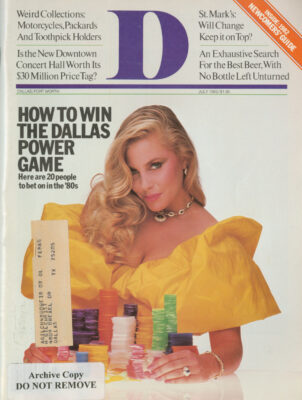WE WERE a barely formed, almost make-believe family when we moved to Dallas in 1966. We came from that psychic territory, The East, which has everything contained within an imaginary border drawn from the Statue of Liberty, south to Princeton, north to Nantucket, west to Bennington College (a women’s college in Vermont known for its pioneering rule in the early Sixties, which required all men to be out of the dorms by 4 a.m.), south to Bobby Short’s piano at the Carlyle Hotel, over to Fifth, south to the Village, continuing on to Wall Street, back to the Statue of Liberty.
We were moving because a big company had told us to move and because it would be important to my career. Dallas was, for this company, an outpost, just as Calcutta was in the days when the sun never set on the British Empire. For us, Dallas seemed a foreign place and, of course, the assassination set the image of the city apart, especially for people from The East.
A few years later, I was introduced to Ted Kennedy, who, when the person making the introduction said I lived in Dallas, said simply, “That’s a pretty rough place.”
What was it like then, and what sticks in my mind 16 years later?
First, there was the city government. Erik Jonsson, one of Texas Instruments’ founders, was mayor. He wanted the city to lift its sights. Originally from Brooklyn, he had seen politics where self-serving men were sometimes seduced by the possibility of diverting cash from the commonweal to their own pockets. That was not his idea of what politics should be. For him, leading the city he loved was the highest calling. Jonsson wanted the city to have a direction. Not a Democratic or Republican direction, but a direction in which pursuit would unite us.
Then there was the contrast in the sense of opportunity. Part of it had to do with moving far away from the expectations, high or low, of people who knew you when. A new place gave you more room to fashion yourself into what you wanted to become. But even apart from that, Dallas offered the chance for involvement-and expected it. Certainly there were fiefdoms, but they had an expansive quality, rather than a contracting one. John Cheever once said, rather harshly, about the area in which I was brought up, “Boston is a city without springboards for people who can’t dive.” Dallas had springboards, and the leaders, for the most part, expected them to be used.
Boston, incidentally, also had a beautiful, idiosyncratic art museum, given by and named for Isabella Stewart Gardner. The museum had what is called a static collection, which, by the terms of the bequest, could neither be added to nor subtracted from. It would be hard to imagine anything more un-Dallaslike.
There was more respect toward authority than 1 had experienced. It had to do, I think, with something A.C. Greene, a historian and writer with strong ties to the real world, told me about Texans’ respect for the boss, the owner, the man who paid your salary. The people weren’t toady, but neither did they automatically scorn the person in charge. That would later begin to break down; but when I arrived, that deferential attitude was noticeable. Especially at SMU. People didn’t meet on the barricades at SMU; they met at Gordo’s. The refrain, “Hell no, we won’t go, we won’t fight for Texaco,” just never caught on.
The Cowboys and the Red Sox’s Ted Williams provided another contrast in attitudes toward authority. The Cowboys were not America’s team yet, but they were Authority’s team. The genius of Lan-dry had not yet been fully recognized, but the manner in which he organized his team and the people around whom he built it gave you hints that although Bobby Layne wouldn’t have been comfortable, the team would be successful. The symbol of Boston’s professional sports, who had retired in 1961 just the way he wanted, with a homer his last time at bat, was Ted Williams. Williams never went along to get along, and generations of us share the secret delight of seeing him flash the bird toward the press box as he rounded third on his way home.
After two years, my family left the bigcorporation and decided to stay in Dallas.Our lives and livelihoods changed in waysthat were enormously lucky. It was thespirit of Dallas and its people that madethe changes possible. It was a place wherethe springboards worked.
Get our weekly recap
Brings new meaning to the phrase Sunday Funday. No spam, ever.
Related Articles

Arts & Entertainment
DIFF Documentary City of Hate Reframes JFK’s Assassination Alongside Modern Dallas
Documentarian Quin Mathews revisited the topic in the wake of a number of tragedies that shared North Texas as their center.
By Austin Zook

Business
How Plug and Play in Frisco and McKinney Is Connecting DFW to a Global Innovation Circuit
The global innovation platform headquartered in Silicon Valley has launched accelerator programs in North Texas focused on sports tech, fintech and AI.

Arts & Entertainment
‘The Trouble is You Think You Have Time’: Paul Levatino on Bastards of Soul
A Q&A with the music-industry veteran and first-time feature director about his new documentary and the loss of a friend.
By Zac Crain


